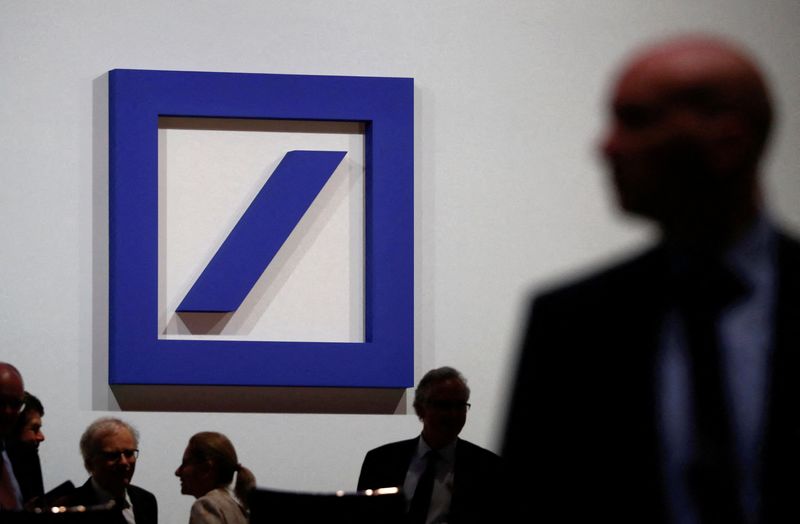By Tom Sims and Sinead Cruise
FRANKFURT/LONDON (Reuters) - European banks this week offered flashes of surprisingly good news on profits, but some executives spoke of a bleak outlook for the rest of the year amid raging inflation, war and energy shortages.
Deutsche Bank (ETR:DBKGn), the German lender in Europe's largest economy, reported on Wednesday larger-than-expected profit for the second quarter that was helped by trading revenue in volatile markets and higher interest rates.
But at the same time, Deutsche abandoned a cost target for 2022, threw doubt on its profit target and scaled back the outlook for its global investment banking division as dealmaking withers.
"The months ahead will continue to be challenging. There is reason to believe that things will become even more difficult economically," Deutsche Bank Chief Executive Christian Sewing wrote to staff.
That split-screen image of solid business coupled with a grimmer outlook is playing out in banks across Europe.
In a week of earnings reports by its major lenders - including UBS, UniCredit (LON:0RLS), and Lloyds Banking Group (LON:LLOY) - investors have been looking for signs that a weaker economy, higher interest rates and the war in Ukraine are weighing on banks' business and outlooks.
Since the war's outbreak, European banks have been thrown into turmoil, trying to cut ties with Russia, executing an array of stiffer sanctions against Moscow, and navigating an uncertain and weakening economy.
Central bank efforts to arrest runaway inflation across Europe with higher borrowing costs have boosted the bottom lines of several top lenders but a big question on bankers' minds now is even deeper cuts in gas supplies will affect banks and economies in the region.
Nicolas Charnay, analyst with the ratings agency S&P, said the impact was likely to vary across Europe.
"What we would probably not do is a kind of broad European based rating action. We would be differentiating across countries, and potentially also across banks," he said.
That echoes the mixed picture painted by this week's earnings.
'UNPRECEDENTED CHALLENGES'
In Switzerland on Tuesday, UBS, the world's biggest wealth manager, set the tone with a profit rise that was smaller than expected and its Chief Executive Ralph Hamers warning about an "uncertain" rest of the year and "subdued" sentiment. The bank's shares tumbled 9%.
In contrast, Italy's UniCredit on Wednesday raised its 2022 outlook after a surprisingly strong second quarter in which it cut its exposure to Russia and moved ahead with a proposed share buyback it had put on hold.
Still, CEO Andrea Orcel said, "The global economy is facing unprecedented challenges and much uncertainty."
In Britain, Lloyds Banking Group, Britain's largest domestic lender, hiked its dividend and full-year profitability forecast despite lower first-half earnings and a murky outlook for the country's economy, as rising interest rates outpace modest growth in provisions for troubled loans.
Chief Executive Charlie Nunn told reporters one in five of its 26 million customers were forced to adapt their spending significantly - with 2.2 million cancelling subscriptions on consumer services such as streaming TV since last summer and the average family spending 89 pounds a month more on energy and food.
UBS' smaller cross-town rival Credit Suisse (SIX:CSGN) reported a deeper-than-expected loss and a reshuffle in top management in its latest effort to recover from a series of scandals and losses.
Amid the noise was the undertone of market turmoil associated with the war, inflation, and resulting client risk aversion.
"We would expect these market conditions to continue for the coming months," Credit Suisse said.
With interest rates on the rise in Europe for the first time in decades, banks are starting to benefit from the increased gap between what they charge borrowers and what they pay savers.
But the same rate rises can also trigger waves of defaults as customers struggle to meet their repayment obligations.

After years of abundant liquidity, the challenge bankers face now is to balance the opportunity of earning more by lending more while pricing the risks appropriately against the backdrop of deteriorating global economic growth outlook.
The International Monetary Fund cut global growth forecasts again on Tuesday, warning that downside risks from high inflation and the Ukraine war were materializing and could push the world economy to the brink of recession if left unchecked.
